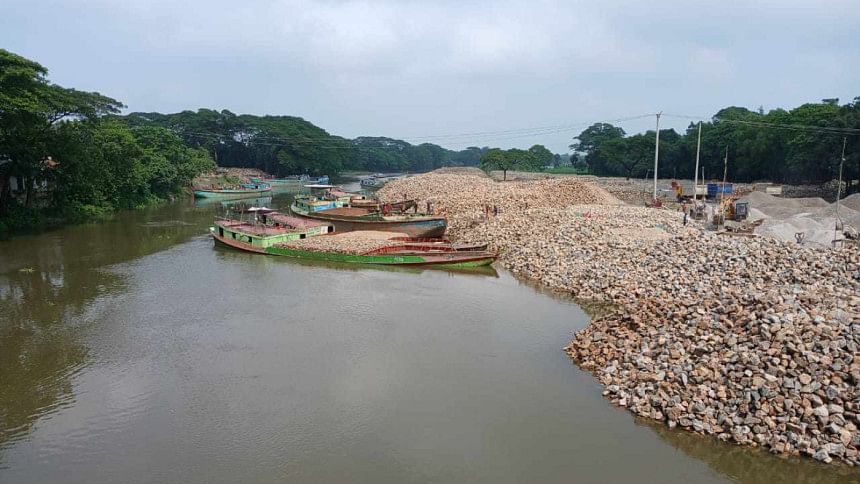Stone crushing business on riverbank threatens Narsunda river

A stone business hub set up along the banks of the Narsunda River in Mymensingh's Targhat area has raised serious concerns over the river's ecological health.
Locally known as the Kanchamatia-Narsunda River, it is the only river flowing through Nandail and Ishwarganj upazilas. The river serves as a vital source of fish and water for irrigation. However, its natural flow has been disrupted in various locations, negatively impacting the region's agriculture, according to Amir Uddin, a resident of Targhat.
To make matters worse, the riverbank has been illegally occupied for establishing a stone-crushing hub. Authorities are taking little action, locals alleged.
Businessmen have been transporting large quantities of stone from Sunamganj, Netrakona, Bhairab, Ashuganj, and Sreemangal to the riverbank, where the stones are crushed for sale. At least 10 crushing machines operate continuously on-site, creating significant dust pollution that affects nearby villages.
This pollution has severely impacted four local educational institutions with over 1,500 students. "The students are the worst affected," a local teacher said.
Locals also claimed that some groups have been illegally grabbing river land for their own purposes.
Advocate Shibbir Ahmed Liton, secretary of Mymensingh Poribesh Rokkha O Unnayan Andolon, and Advocate Nazrul Islam Chunnu, convener of Jonoudyog-Mymensingh, urged authorities to intervene and address the pollution and encroachment.
Iftekar Uddin Bhuiyan Biplob, chairman of Musulli union parishad, confirmed that the stone traders lacked leases or environmental clearance from the Department of Environment (DoE). They have been conducting their business for 30 years, relying solely on trade licenses issued by the parishad.
Md Ayub Ali Khan, president of the Targhat Stone Traders' Association, said that the local administration had ordered them to remove the stones from the riverbank. "We are currently working on obtaining environmental clearance certificates from the DoE," he added.
Nazia Ahmed, assistant director of the DoE in Mymensingh, stated that some traders had recently contacted the department to understand the process for obtaining environmental clearance.
Mesbabur Alam, DoE director in Mymensingh, explained that to legally set up a stone-crushing business, a safe zone must be approved by a committee led by the local Upazila Nirbahi Officer (UNO). Afterward, businesses can apply for environmental clearance and then a license from the district administration.
Arun Krishna Paul, UNO of Nandail, confirmed that a mobile court had recently instructed the businessmen to cease operations and vacate the riverbank due to illegal occupation and lack of proper clearances.
Md Akhlak Ul Jamil, executive engineer of the Bangladesh Water Development Board in Mymensingh, said that the river had lost navigability in several sections and required dredging. He also confirmed that surveys for river demarcation would be conducted soon, ahead of drives to evict illegal occupiers.

 For all latest news, follow The Daily Star's Google News channel.
For all latest news, follow The Daily Star's Google News channel. 


Comments